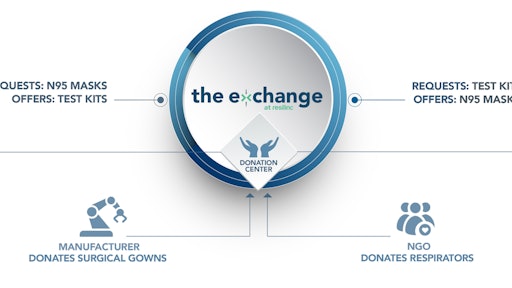

Resilinc and Premier Inc. announced the roll out of The Exchange at Resilinc. The Exchange is a cloud-based platform for the healthcare industry where hospitals interact with vetted peer organizations to identify, locate and exchange critical medical items during the COVID-19 outbreak.
The exchange platform, in collaboration with Stanford Medicine, will launch in mid-April and is now accepting applications for providers and industry groups to join at no cost.
Through the Exchange – which is agnostic to any group purchasing organization – hospitals and frontline healthcare providers experiencing supply shortages can submit requests for specific items and be matched with peer organizations who can supply those items through a safe, secure and trusted network. Donations of critical supplies are also welcome and will be disbursed through an integrated donation center.
“Resilinc is proud to collaborate with Premier and Stanford Medicine to bring the Exchange from concept to reality, leveraging our experience in helping our customers protect their supply chains from disruptions,” said Bindiya Vakil, CEO and founder of Resilinc. “Many hospitals searching for items that are on allocation by suppliers must manually locate other hospitals who have inventory. This can be time consuming, less successful and has a narrow geographic reach. The Exchange at Resilinc is a modern, cloud-based tool that can expedite communications between hospitals and help them instantly locate and negotiate for medical supplies among thousands of hospitals nationwide.”
“With COVID-19, we are experiencing an unforeseen and unprecedented level of stress on caregivers and supply chains,” said Chaun Powell, group vice president of strategic supplier engagement at Premier, which unites an alliance of more than 4,000 hospitals and health systems and 175,000 other providers. “With more than 9,300 items on allocation across the country, Premier continues to advocate for industry-wide collaboration that increases transparency into the supply chain, so we can accelerate problem-solving at scale and get supplies to providers with the greatest need. Premier is proud to help found this exchange and cut across traditional boundaries for the benefit of all.”
Amanda Chawla, vice president of supply chain at Stanford Health Care, Stanford Children’s Health, and Stanford Health Care – ValleyCare, envisioned a tool that would allow healthcare professionals to connect with their peers during the COVID-19 pandemic and place critical medical supplies where they are needed most. “Together with Resilinc, we have created a platform that goes beyond traditional networks and boundaries to allow us to connect and support not only our local community, but the greater community, in the fight against COVID-19,” Chawla said.
Shortages occur across critical product categories for a myriad of reasons including the location of raw materials and manufacturing, demand planning, industry protocols and regulation, sterilization and policies. The COVID-19 pandemic is an especially relevant example of how a domestic exchange between providers and trusted partners can help enable access to products that are in short supply.


























